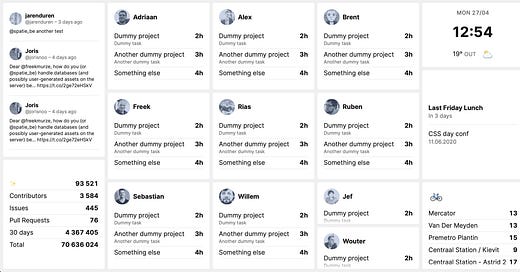#5 Vue 3 beta released, laravel-dashboard available, and more
Welcome to the 5th Andy's Web Dev Tips newsletter! Here's a few things from this week:
Vue 3 is officially in beta
After much anticipation, Evan You announced Vue.js 3.0 as being in beta. This doesn’t hold any particular significance if you’ve already been experimenting with the new version of the framework, but it’s an important milestone in this new huge release. All of the RFC’s have been merged and implemented, with focus being turned toward stability and existing library implementations.
The official State of Vue announcement contains 25 slides detailing information about the current codebase, performance enhancements over Vue 2, TypeScript support, and remaining items that need to be worked on before the official release. You can also view the full roadmap on GitHub if you would like a better overview of what’s left.
Spatie’s laravel-dashboard is available for download
Freek Van der Herten was teasing a new Spatie package over the course of the last few weeks, and officially released it on April 30th. Dubbed laravel-dashboard, it’s a sleek and simplistic framework package for getting a dashboard (like the one shown below) up in just a short time.

It’s pretty straight-forward, each “tile” is a separate package that’s composed of a Laravel Blade component. Some also contain interactivity powered by Laravel Livewire, but any front-end framework should be possible if you’re deciding to write your own tiles. Check out the full project and getting started guide on GitHub.
Baiting your website with fake data
A pretty interesting thread that I came across on Twitter dealt with levelsio’s site NomadList. He went into brief detail about how he added a fake city in Japan to his app called Dorobō (ironically meaning thief in Japanese), to track if any data was being scraped, and by who. It’s a pretty interesting concept for a honeypot, essentially creating a fake data point that would only be accessible to people or bots that perform a full scrape of your site’s data. If you see a competing site that contains your bait data, you know that they scraped your app for it.
Null coalescing assignment operators make for clean code
If you’ve been using PHP 7 for a while, you might have already known about (or used) a null coalescing operator to determine if an array value is set. However, brand new in PHP 7.4 is the null coalescing assignment operator. It works super similarly, but with an even smaller code footprint.
Instead of a separate equality and null coalescing operator, a single operator determines if the index is set, and either uses it or assigns a default value if it’s not.

The above is courtesy of @enunomaduro
That’s it for this week! If you have any questions about the above, or have something you’d like me to check out, please feel free to let me know on Twitter.



